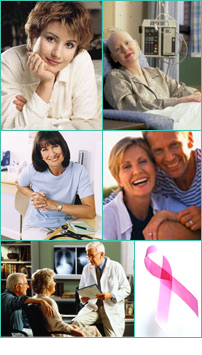Many women who have had breast cancer go on to have children. Some breast cancer survivors are even able to breastfeed their infant. Retaining your fertility and your ability to breastfeed depend upon the type of breast cancer you have, the particular characteristics of your tumor, and the types of treatment you get. As a general rule, smaller, early-stage tumors are less likely to interfere with fertility and breastfeeding, than larger, later-stage tumors.
Studies have demonstrated that radiation treatment of the breast area does not decrease a woman’s ability to get pregnant or to bear a full-term baby.
In contrast, certain other treatments for breast cancer cause many women to stop menstruating temporarily. This response is your body’s natural reaction to extreme stress and its way of trying to conserve energy for healing, rather than reproduction. In most cases, menstruation resumes a few months after treatment stops. One study showed that about half of the treated women under age 35 got their periods again after finishing chemotherapy.
However, many women experience less frequent or erratic periods, whereas other women never start menstruating again.
Chemotherapy can impact fertility, especially in women over the age of 40 who are approaching the normal age of menopause. Although chemotherapy does not affect your eggs and ovaries, chemotherapy has been shown to cause premature menopause in about 10% of women who were still menstruating when treatment began. The older the women were when they had chemotherapy, the greater their chances of developing permanent menopause.
Most studies seem to indicate that a woman’s chances of remaining fertile after chemotherapy are greatest if:
She was young (i.e.: not close to the normal age of menopause) at the time of treatment
She received a limited amount of chemotherapy
The drugs, cytoxan and methotrexate, were not part of her chemotherapy regimen.
If you are still planning to have children after treatment, it is important that you discuss this with your oncologist. If he or she knows that maintaining fertility is a concern, your oncologist may be able to tailor your treatment to improve your chances of avoiding premature menopause.
If your cancer is more advanced and requires aggressive treatment which increases your risk of premature menopause, you may want to speak with an infertility specialist before starting treatment. There are several options regarding infertility treatment that are available to you. You might want to consider having eggs extracted from your ovaries, and that are stored and frozen to await implantation until after your treatment is finished. This way if your ovaries do shut down permanently because of the chemotherapy, implantation with your stored eggs will allow you to become pregnant. Unfortunately, this method of infertility treatment is extremely expensive and often is not covered by insurance policies.
Many doctors suggest that women wait between 2 and 5 years after treatment, before trying to get pregnant. Because most signs of the more aggressive types of breast cancer usually manifest themselves during this time period, waiting allows you to be relatively certain that you will remain healthy during your pregnancy. This waiting period is particularly important for women who have suffered hormone-sensitive forms of cancer, because the growth of recurrent cancers that are hormone-sensitive could be stimulated by the hormonal fluctuations of pregnancy.
Women who are unable to wait a few years before becoming pregnant because of time constraints due to age, should give their bodies at least one year to recover from the impact of chemotherapy, before facing the physiological (biological) and physical stresses of pregnancy.
|


